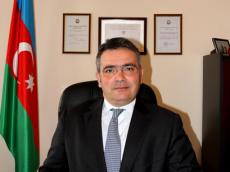|
|
TODAY.AZ / Politics
Azerbaijani envoy: Armenian new leadership’s actions far from optimism
29 May 2018 [12:33] - TODAY.AZ

By Trend
Unfortunately, so far the Armenian new leadership’s actions and behaviour in handling the Armenia-Azerbaijan Nagorno-Karabakh conflict issues have been far from inspiring optimism, Azerbaijani Ambassador to Belgium Fuad Isgandarov said in an interview with EURACTIV media platform.
“The Armenian previous government made its survival through its radical destructive policy towards conflict settlement,” he said.
“The current Armenian government is facing the debris of this policy,” Isgandarov added. “They need “fresh air” and “fresh blood” to revive the economy which is in a shambles. They should strive to become an inclusive partner in projects in the region.”
“This is possible only through building normal relations with neighbouring countries,” he said. “In his early days of office, Armenian Prime Minister Nikol Pashinyan went to the occupied Nagorno-Karabakh region to celebrate the anniversary of occupation of Shusha, a city where ethnic Azerbaijanis constituted an overwhelming majority.”
“There he voiced controversial statements about “annexing Nagorno-Karabakh to Armenia” and introducing new “conflict parties” to the negotiation format which did not fit into the context and substance of negotiations mediated by the OSCE Minsk Group,” Isgandarov said. “There is no need to reinvent the wheel.”
“The new leadership’s aggressive rhetoric was followed by a military provocation at the Azerbaijan-Armenia state border where an Azerbaijani soldier was shot dead in Nakhchivan,” the ambassador said.
“In the meantime, Azerbaijani Foreign Minister Elmar Mammadyarov met OSCE Minsk Group Co-Chairs in Paris where he reiterated Azerbaijan’s interest in pushing ahead substantial negotiations,” he said.
“So, you can see differences between these two approaches - continuing aggressive actions and rhetoric on the one hand, and a constructive approach on the other,” Isgandarov said. “I hope the international community will adequately assess it.”
The conflict between the two South Caucasus countries began in 1988 when Armenia made territorial claims against Azerbaijan. As a result of the ensuing war, in 1992 Armenian armed forces occupied 20 percent of Azerbaijan, including the Nagorno-Karabakh region and seven surrounding districts.
The 1994 ceasefire agreement was followed by peace negotiations. Armenia has not yet implemented four UN Security Council resolutions on withdrawal of its armed forces from the Nagorno-Karabakh and the surrounding districts.
“The European Union is not involved in the settlement of the conflict,” he said. “But this does not prevent the EU from promoting and international law-based solution to the conflict and supporting the territorial integrity, sovereignty, independence and inviolability of internationally recognized borders of partner countries which were identified as key principles of European security in the EU’s Global Strategy.”
“We appreciate and value the EU’s explicit and consistent position in supporting these principles in its relations with Azerbaijan,” the ambassador said.
URL: http://www.today.az/news/politics/170511.html
 Print version
Print version
Connect with us. Get latest news and updates.
See Also
- 24 April 2024 [17:31]
Lachin holds significant potential for hydroelectric development - 24 April 2024 [16:59]
Azerbaijan continues contributing to peace, security and prosperity through diplomacy, MFA - 24 April 2024 [15:17]
President Ilham Aliyev's vision portrays Azerbaijan's sustainable economic growth [COMMENTARY] - 24 April 2024 [13:49]
Azerbaijan and Kyrgyzstan sign documents [PHOTOS/VIDEO] - 24 April 2024 [13:36]
President Ilham Aliyev, President Sadyr Zhaparov make press statements [PHOTOS/VIDEO] - 24 April 2024 [13:05]
2nd meeting of Azerbaijan-Kyrgyzstan Interstate Council started [PHOTOS/VIDEO] - 24 April 2024 [12:00]
Meeting between Presidents of Azerbaijan and Kyrgyzstan commenced in limited format [PHOTOS/VIDEO] - 24 April 2024 [11:50]
Official welcome ceremony held for President of Kyrgyzstan Sadyr Zhaparov [PHOTOS/VIDEO] - 24 April 2024 [11:30]
President of Kyrgyzstan Sadyr Zhaparov arrives in Azerbaijan for state visit - 24 April 2024 [11:25]
World's leading think tanks reps are in Garabagh
Most Popular
 CBA forges strategic partnership with VISA to drive payment sector innovation
CBA forges strategic partnership with VISA to drive payment sector innovation
 Poland to host event to investigate possibilities of exporting Polish agricultural products to Azerbaijan
Poland to host event to investigate possibilities of exporting Polish agricultural products to Azerbaijan
 Cargo, passenger transportation increases in Azerbaijan
Cargo, passenger transportation increases in Azerbaijan
 Azerbaijan congratulates Algeria on 30th anniversary of relations
Azerbaijan congratulates Algeria on 30th anniversary of relations
 President Ilham Aliyev holds one-on-one meeting with President Vladimir Putin [PHOTOS/VIDEO]
President Ilham Aliyev holds one-on-one meeting with President Vladimir Putin [PHOTOS/VIDEO]
 SOCAR and bp host field visits under global methane emission reduction initiative
SOCAR and bp host field visits under global methane emission reduction initiative
 Kremlin: Russia, Azerbaijan encouraged to enhance trade relations
Kremlin: Russia, Azerbaijan encouraged to enhance trade relations
